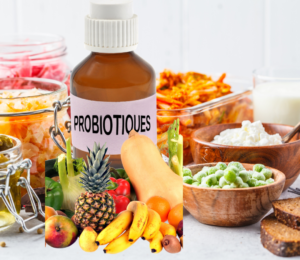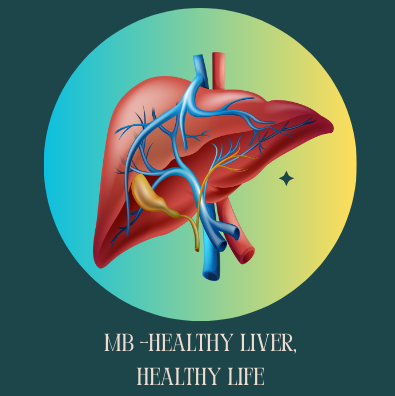The Gut-Liver Connection: How Probiotics Can Improve NAFLD Fibrosis
The Gut-Liver Connection -Overview
The prevalence of non-alcoholic fatty liver disease (NAFLD) is rising as a global health concern. NAFLD, which affects millions of people globally, is caused by hepatic fat accumulation, which causes inflammation and possibly dangerous side effects like fibrosis. Liver tissue scarring, known as fibrosis, can lead to cirrhosis, liver failure, or even malignancy. Probiotics have surfaced as a beneficial dietary supplement to manage non-alcoholic fatty liver disease (NAFLD) and related fibrosis as researchers investigate therapy possibilities. However, what is their effectiveness?Fatty Liver Disease -9 Positive Strategies for fatty liver well being

Knowing About Fatty Liver Disease (NAFLD), a Non-Alcoholic
The term NAFLD describes the buildup of fat in liver cells that is unrelated to alcohol use. This illness can range from non-alcoholic steatohepatitis (NASH), which causes inflammation and damage to the liver cells, to plain fatty liver (steatosis). Obesity, insulin resistance, type 2 diabetes, and metabolic syndrome are risk factors for non-alcoholic fatty liver disease (NAFLD). One of the main causes of chronic liver disease worldwide today is NAFLD, which is a result of the rise in obesity and sedentary lifestyles.
NAFLD Fibrosis: An Essential Aspect of Hepatic Function
Fibrosis is the body’s normal reaction to damage to the liver, causing scar tissue to grow in its place. On the other hand, severe fibrosis might impede liver function in chronic diseases such as NAFLD. Evaluation of fibrosis is essential for NAFLD management as it helps forecast the development of cirrhosis. A fibrosis score—a rating system that establishes the degree of liver scarring—is used to quantify fibrosis.
An Overview of Probiotics
When taken in sufficient quantities, probiotics, sometimes known as “good bacteria,” are live microorganisms that have been shown to provide health advantages. Though studies indicates they may also affect several other elements of health, like as liver function, they are primarily recognized for their beneficial impact on gut health. Probiotics are available as dietary supplements and in fermented foods such as kefir, yogurt, and sauerkraut. Bifidobacterium and Lactobacillus are common strains.
The Impact of Probiotics: An Understanding of the Gut-Liver Axis
The term “gut-liver axis” describes the intimate connection that exists between the liver and the gastrointestinal system. Blood from the intestines is received by the liver along with nutrients, poisons, and metabolites from gut microorganisms. Increased intestinal permeability (also known as “leaky gut”) resulting from an unfavorable gut microbiome can allow pathogens to enter the bloodstream and cause inflammation in the liver, which is a major factor in the advancement of non-alcoholic fatty liver disease (NAFLD). Probiotics may lessen toxic bacterial metabolites that cause liver damage by assisting in the restoration of gut equilibrium.
The Ways in Which Probiotics Could Affect NAFLD Fibrosis
The benefits of probiotics for NAFLD patients can be attributed to several mechanisms:
Reducing Inflammation: One of the main ways that probiotics help with liver fibrosis is by reducing the generation of inflammatory cytokines.
Improving the Function of the Gut Barrier: Probiotics lessen the entry of toxic substances and pathogenic microorganisms into the liver by fortifying the intestinal lining.
Modulation of Lipid Metabolism: It has been demonstrated that certain probiotic strains improve lipid metabolism, therefore reducing the buildup of fat in the liver.
Changing the Composition of the Microbiota: Probiotics have the ability to increase the growth of good bacteria while suppressing the growth of detrimental species, hence enhancing gut health and lowering hepatic stress.
Studies Backing Up on Probiotic Usage in NAFLD Patients
Probiotic supplements have produced encouraging outcomes for NAFLD patients, according to studies. Certain probiotics dramatically improved liver enzyme levels, decreased inflammation, and lowered fibrosis scores in individuals with nonalcoholic fatty liver disease (NAFLD), according to a systematic review of clinical trials. Probiotics with a high level of effectiveness include Lactobacillus rhamnosus and Bifidobacterium lactis. Probiotics have been shown in studies to have a favorable impact on liver fat and liver enzymes like ALT and AST, which are important markers of liver function in nonalcoholic fatty liver disease (NAFLD).
What Is Known About Probiotic Supplementation and Fibrosis Scores?
The results of liver biopsies, imaging methods, and blood tests are combined to calculate fibrotic ratings. Probiotic supplementation has been shown in multiple studies to reduce fibrosis scores in NAFLD patients, although more study is needed in this area. This implies that probiotics reduce the development of fibrosis in addition to reducing liver inflammation and fat storage. However, the results differ according on the probiotic strain and treatment period.
Clinical Trials: Supplementing NAFLD Patients with Probiotics
RCTs, or randomized controlled studies, have shed important light on the function of probiotics in non-alcoholic fatty liver disease (NAFLD). Probiotic supplement users dramatically reduced their liver enzyme levels and improved their fibrosis scores when compared to a placebo group in one study of NAFLD patients. The outcomes also showed a decrease in systemic inflammation and enhancements to the integrity of the intestinal barrier. These clinical results demonstrate how probiotic administration may help manage NAFLD in the long run.
Probiotic Types Often Used in the Treatment of NAFLD
Probiotics that have been researched the most for treating NAFLD include:
Lactobacillus species: renowned for their capacity to enhance the function of the gut barrier and their anti-inflammatory qualities.
Bifidobacterium species: Good at enhancing lipid metabolism and modifying the gut microbiome.
Supplements containing many strains of probiotics are designed to address various facets of the health of the stomach and liver.
Obstacles in the Treatment of NAFLD with Probiotics
Probiotics have promise; however, there are still a number of issues to be resolved:
Lack of Standards: The benefits of various probiotic formulations can differ, and not all strains of the bacteria are equally useful in treating nonalcoholic fatty liver disease.
Patient Variability: Depending on their age, nutrition, and genetic makeup, people with NAFLD may react to probiotics in different ways.
Requirement for Tailored Treatment: There is increasing awareness that probiotic regimens may need to be customized based on each patient’s unique gut microbiota composition.
Probiotics vs Conventional NAFLD Treatments
Conventional therapies for non-alcoholic fatty liver disease (NAFLD) frequently emphasize dietary adjustments, exercise, and weight loss. Additionally, medications like as insulin sensitizers and statins are taken. Compared to medications, probiotics are a more natural solution with fewer side effects. They work best when combined with dietary and medicinal measures, though, and should not be used as a stand-alone treatment.

Modifications to Diet and Lifestyle in addition to Probiotic Usage
Patients with NAFLD should adopt a nutritious diet high in fruits, vegetables, and fiber to optimize the advantages of probiotics. The two most important tactics for lowering liver fat and enhancing liver health are regular exercise and weight loss. The best results from probiotics come from a comprehensive treatment program that incorporates these lifestyle changes.
Probiotic Use’s Safety and Adverse Effects in NAFLD Patients
For the majority of people, probiotics are thought to be safe. On the other hand, some people could have moderate gastrointestinal problems like bloating or gas. Before beginning probiotic supplements, it’s crucial to speak with a doctor, especially if you have liver illness, as these patients may have more sensitive gut bacteria.
In summary
Probiotic supplements have a lot of potential for treating NAFLD, especially when it comes to enhancing liver function and lowering fibrosis scores. Although further investigation is required to completely comprehend the long-term impacts and ideal strains, available data indicates that probiotics can be an important component of an all-encompassing therapeutic strategy. Probiotics are a safe, natural supplement that helps patients with nonalcoholic fatty liver disease (NAFLD) by reducing liver fat, reducing inflammation, and enhancing gut health.
FAQ
1. Can probiotics help reverse NAFLD-related liver fibrosis?
Probiotics are unlikely to totally reverse severe fibrosis, although they may help delay the disease’s progression. In the early stages, they can, however, lessen inflammation and enhance liver function.
2. How long do probiotics take to start having an impact on liver health?
While the benefits of probiotics can differ, continuous use for 8 to 12 weeks can lead to improvements in gut health and liver enzymes.
3. Does using probiotics increase the risk of liver disease?
Probiotics are generally safe, but before beginning a supplement, anyone with severe liver illness should speak with their physician.
4. Which strains of probiotics are most beneficial for people with NAFLD?
In NAFLD-related clinical trials, strains including Lactobacillus rhamnosus and Bifidobacterium lactis have shown the most potential.
5. Can treating NAFLD with probiotic supplements be sufficient?
Probiotics can be a useful addition to medication and lifestyle modifications; they are not a stand-alone treatment.
 https://analytics.google.com/analytics/web/#/analysis/p405220706
Skip to content
https://analytics.google.com/analytics/web/#/analysis/p405220706
Skip to content 

Hi My name is Simon. I did a google search and I noticed that fattyliverdisease.fun isn’t really getting that many free leads from social media.
I think you are good company and you should be getting more (and better) leads.
Can I help you solve your lead issue without increasing your workload? I can show you live on zoom, for free.
Hope over here
https://bit.ly/live-dec
Regards,
Simon
169 Homan Ln, Centre Hall, PA 16828
Thank you for encouraging me
I noticed a few issues on your website and want to fix them for you for free, what’s a good phone number to get ahold of you on?
Thank you Bobby
My name is Kim and I’m with a publishing firm out of Los Angeles. Our team came across your info and were interested in your work..
We’re always on the lookout for interesting people and stories to write about, and yours caught our attention. We’d love to offer you a complimentary sample of our writing to show you what your story could look like on paper.
If you’d be interested in a quick sample of our work please book a time to chat here.
https://calendly.com/mystoryonboarding/discovery-call?utm_source=form&utm_campaign=a1&month=2025-08
Hope to hear from you soon!
Kim
PO Box Addresss
Unsubscribe:
~ulr~